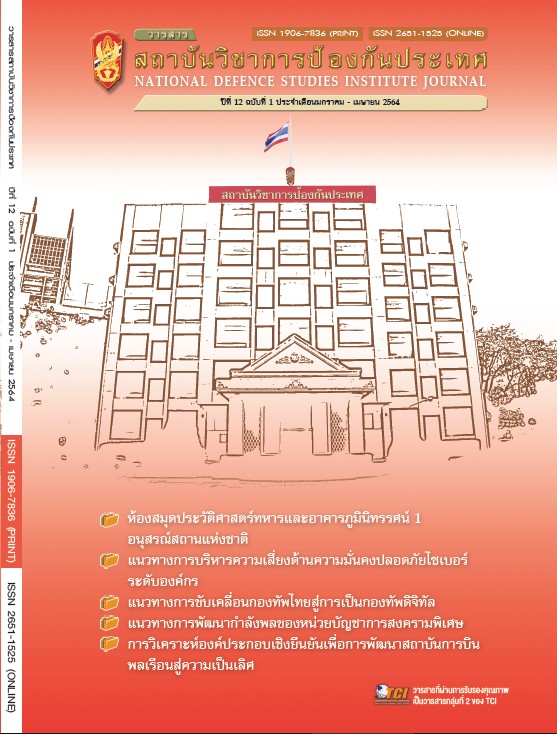M.R.Kukrit Pramoj’s Royalist Ideology and Political Concept
Main Article Content
Abstract
The objectives of this study are 1) to study the origin of his political concept, 2) to investigate the impact of the political concept of M.R.Kukrit Pramoj on the survival of the Siam Rath newspaper and 3) to study his ethical concept in his role as a journalist. The data are collected from articles published in the Siam Rath newspaper, books, interviews from those involved with M.R.Kukrit Pramoj, and related documents. The data are analyzed based on theories of political economy of mass communication and theories of discourse analysis.
The result shows that M.R. Kukrit Pramoj’s royalist ideology, understanding of politics and journalism, and journalistic prowess contributed to the continuity of the newspaper’s operation, preventing it from being shut down by military orders during the period of military dictatorship. His political loyalty stemmed from his birth as a member of the royal family while his democratic perspectives originated from his study in foreign countries. He understood that, for Thailand, conversion to international democracy took a lot of time. To preserve journalist ethics and morality, newspapers should take society, law, and culture into consideration. What M.R. Kukrit Pramoj was mostly concerned with was how the newspaper refused money from the government or politicians. What contributed to freedom in its professional and ethical practice was that the newspaper needed to become popular and to be publicly accepted.
Article Details

This work is licensed under a Creative Commons Attribution-NonCommercial-NoDerivatives 4.0 International License.
The articles, images, tables, graphs, written content, and opinions published in this journal are solely those of the authors and do not necessarily reflect the views or positions of the National Defence Studies Institute or its academic affiliates.
References
กนกศักดิ์ แก้วเทพ และคณะ. (2550). มรรควิธีเศรษฐศาสตร์การเมือง. กรุงเทพฯ: คณะเศรษฐศาสตร์ จุฬาลงกรณ์มหาวิทยาลัย.
กาญจนา แก้วเทพ. (2552). สื่อสารมวลชน: ทฤษฎีและแนวทางการศึกษา. กรุงเทพฯ: ห้างหุ้นส่วนจำกัดภาพพิมพ์.
คึกฤทธิ์ ปราโมช, ม.ร.ว. (2553). เกร็ดชีวิต. กรุงเทพฯ: ดอกหญ้า.
_______. (2554). นักหนังสือพิมพ์ชื่อ คึกฤทธิ์. กรุงเทพฯ: สำนักพิมพ์ดอกหญ้า.
ชัชวาลล์ คงอุดม. นักการเมือง, นักหนังสือพิมพ์. (19 เมษายน 2562). สัมภาษณ์.
ไชยรัตน์ เจริญสินโอฬาร. (2551). รัฐศาสตร์แนววิพากษ์ (พิมพ์ครั้งที่ 3). กรุงเทพฯ: สำนักพิมพ์มหาวิทยาลัยธรรมศาสตร์.
ธีรยุทธ บุญมี. (2536). จุดเปลี่ยนแห่งยุคสมัย. กรุงเทพฯ: สำนักพิมพ์วิญญูชน.
บุญส่ง ชเลธร. นักวิชาการ. (12 พฤษภาคม 2562). สัมภาษณ์.
ทวี พันธุ์สุระ. อดีตเลขานุการ ม.ร.ว.คึกฤทธิ์ ปราโมช. (12 พฤษภาคม 2562). สัมภาษณ์.
ทักษ์ เฉลิมเตียรณ. (2548). การเมืองระบบพ่อขุนอุปถัมภ์แบบเผด็จการ. กรุงเทพฯ: โรงพิมพ์มหาวิทยาลัยธรรมศาสตร์.
วิทยากร เชียงกูล. (2532). ศึกษาบทบาทและความคิด ม.ร.ว.คึกฤทธิ์ ปราโมช. กรุงเทพฯ: สำนักพิมพ์ผลึก.
วิโรจน์ วัฒนธาดากุล. บรรณาธิการหนังสือพิมพ์สยามรัฐ. (12 พฤษภาคม 2562). สัมภาษณ์.
สังศิต พิริยะรังสรรค์. (2526). ทุนนิยมขุนนางไทย (พ.ศ.2475-2503). กรุงเทพฯ: สถาบันวิจัยสังคม.
Baran, S. J. and Davis, D. K. (2000). Mass Communication Theory. Foundations, Ferment and Future. Ontario: Nelson/Thomson Learning.
Caporaso, J. A. and Levine, D. P. (1992). Theories of Political Economy. Cambridge: Cambridge University Press.
Fairclough, N. (1992). Discourse and Social Change. Cambridge: Harvard University Press.
________. (1995). Media Discourse. New York: Edward Arnold.
Jorgensen, M., and Phillips, L. J. (2002). Discourse Analysis as Theory and Method. London: SAGE Publications Ltd.
McQuail, D. (1987). Mass Communication Theory: An introduction (2nd ed.). London: Sage Publications.
Wodak, R., and Meyer, M. (2001). Methods of Critical Discourse Analysis. London: SAGE Publications Ltd.


